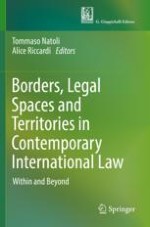2019 | OriginalPaper | Buchkapitel
The Sky’s Not the Limit: Legal Bonds and Boundaries in Claiming Sovereignty over Celestial Bodies
verfasst von : Paolo Turrini
Erschienen in: Borders, Legal Spaces and Territories in Contemporary International Law
Aktivieren Sie unsere intelligente Suche, um passende Fachinhalte oder Patente zu finden.
Wählen Sie Textabschnitte aus um mit Künstlicher Intelligenz passenden Patente zu finden. powered by
Markieren Sie Textabschnitte, um KI-gestützt weitere passende Inhalte zu finden. powered by
